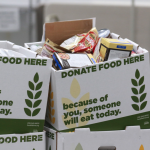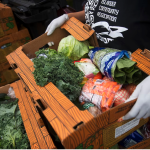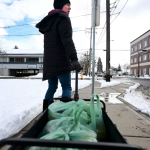News & Events

UW dietetic interns explore sustainable diets
March 8, 2023
March is National Nutrition Month and the theme for 2023 is “Fuel for the Future,” an invitation by the Academy of Nutrition and Dietetics (AND) encouraging each of us to eat with sustainability in mind. This means choosing foods that are tasty, nourishing, and foods that also protect the environment.
Read more
Survey shows food insecurity remains high in Washington state
March 8, 2023 | KOMO News
UW associate professor Jennifer Otten was interviewed in this video and article from KOMO News about the recent results from the WAFOOD survey the impacts on low income households, particularly those with children. How Washingtonians are copying with food and fuel costs is highlighted.
Read article
How WA food banks are handling a hunger cliff
March 8, 2023 | KUOW
The state of food insecurity in Washington state, as changes in federal law that will end $95 million a month in food assistance. Recently published new data from a UW and WSU survey highlights that food insecurity was highest in households made up of people of color, families with children, and among renters.
Read article
Fund food insecurity response in WA — and demand national fix
March 6, 2023 | Seattle Times
Editorial featured in Seattle Times highlights legislative House bill 1784 which provides aencies charged with making sure those who are food insecure are asking the state for an emergency infusion of $28 million to help increase inventories at food banks and other agencies purchasing food and supplies, help manage storage facilities, food delivery and logistics, and maintain outreach to those who may not have access or know about such services.
Read article
Food insecurity remains high in Spokane and statewide, UW-WSU survey shows
March 5, 2023 | The Spokesman-Review
Dr. Marie Spiker is quoted in this article which highlights the increasing costs of groceries and cuts to the Supplemental Nutrition Food Assistance Program (SNAP), and the most recent data from the WAFOOD survey conducted by UW and WSU in December 2022 – January 2023.
Read article
Food insecurity persists in WA, just as emergency benefits expire
February 28, 2023 | Seattle Times
Story provides insight into the region’s looming hunger relief problems citing new data from the UW & WSU WAFOOD survey, and the concern that pandemic-era meal assistance benefits run out this week.
Read article
SNAP cuts lead to warning of “hunger cliff”
February 27, 2023 | AXIOS Seattle
Story highlighting how pandemic food aid is ending nationwide, and this change in the federal law means more than half a million households in Washington will lose a total of about $95 million a month in food assistance even as food and fuel costs remain high or increase. Data cited in the article was recently published by the UW & WSU WAFOOD survey.
Read article
Low-income Washington state households still struggling with food insecurity as pandemic protections end
February 23, 2023
Affording food is such a challenge in Washington state that residents who experience food insecurity say their grocery bills are their biggest source of financial stress, more so than paying for rent or utilities. That’s one of the findings of a food survey of Washington residents from December 2022 to January 2023, run by researchers...
Read more
The pandemic is supposed to be over. Why is Pierce County food insecurity still so high?
February 23, 2023 | The News Tribune
Story highlights WAFOOD research published in 2023 which finds almost half of responding households reported experiencing food insecurity in the past month — with the highest occurrences among BIPOC respondents, households with children and renters. Meanwhile, the overall reliance on food assistance programs and food banks remained high.
Read article
UW courses offered in nutrition, food systems, and health in spring 2023
February 8, 2023
Explore our undergraduate courses for spring 2023 which focus on a variety of interesting topics including nutrition, food systems, diets, culinary science, and individual and population health. Registration opens on February 10, 2023. 2023 Nutritional Sciences Program Courses Click title to view seat availability in My Plan.
Read more